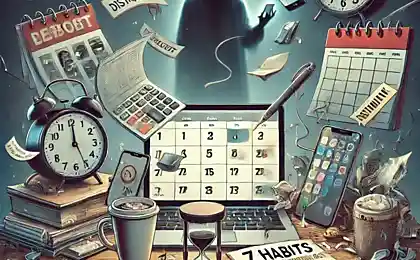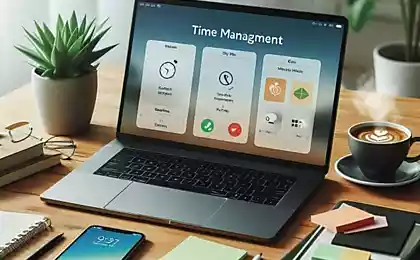559
How to become more productive—7 tips
Cammy FEM – blogger and digital strategist in the canadian Filemobile shares his knowledge on how you can become better armed with science
When I was 17, I worked and studied for 20 hours a day. In College I was doing homework during breaks, and at night was engaged in civil organization. Hard work has opened doors for me in the best company. When I got older, I began to think otherwise. I realized that working more does not mean to be more productive. Sometimes, working less can achieve great results.
Take an entrepreneur who is always working. Mere employment does not give him the opportunity to compete with wealthier competition. Time – limited commodity. The businessman can operate 24 hours a day and seven days a week. His or her competitor can always spend more money to build a big team and spend a lot more time in the same project. Then the question arises: why small businesses do what big corporations can't? Facebook bought Instagram for a billion dollars, its founder, became the 13th person in the company. Snapchat is a young startup with 30 employees went the other way. The company rejected a proposal from tech giants like Facebook and Google. Part of their success explained by luck, the rest is efficiency.
The key to success is not to work hard and work smart. There is a big difference between being busy and being productive. Speaking of productivity, less attention is paid to time management, and more – to focus your energy. We must learn to spend less energy but get more benefit. I understand what needs to be done to reduce my work week from 80 hours to 40 hours, and get the best result. In other words: less is better.
Here are seven things I stopped doing to become more productive.
1. Stop working overtime and increase your productivity
Have you ever wondered whence came the working week? In 1926, the founder of the Ford Motor Company, Henry Ford conducted experiments and got interesting results: when you decrease your daily working hours from ten to eight and reduce the working week from six days to five, your productivity increases.

The more you work, the less effective you become in the short and long term.
It is unlikely that you are experiencing a special optimism and joy after a sleepless night. Rather, you feel worse than usual. In the long term this should lead to a bad mood is a logical consequence of overwork. Loss mood, reduced ability to think and to be active, to control impulses, feel positive, to empathize with others, to use their EI (emotional intelligence) are of great importance.
For us it is important not to overload yourself and get enough sleep to maintain a high level of performance. Sometimes you ask yourself the question: why can't work productively? The reason is simple: you are one of those 70% of people who don't get enough sleep.
Did you know?
Leonardo da Vinci slept several times a day and slept less at night.
The French Emperor Napoleon did not hesitate daily to NAP during the day.
Though Thomas Edison was dissatisfied with his habit to NAP during the day, it is still daily practiced this ritual.
President John F. Kennedy ate his lunch in bed and then he came "quiet time".
Oil industrialist and philanthropist John D. Rockefeller was Napping every day in his office.
Afternoon NAP Winston Churchill was not subject to discussion. He believed that it helped him to do twice the business.
President Lyndon Johnson went to take a NAP every day at 15:30 to divide your day into "two shifts".
Many have criticized him for it, but President Ronald Reagan liked to daydream.
From personal experience I will say that since I started sleeping 7-8 hours a day, I am much more productive than when I worked 16 hours a day. Who knew that sleep could be a great tool for marketers?
2. Don't say "Yes" too often
According to the Pareto principle, 20% effort gives 80% results. On the other hand, 20% of the results consumes 80% of the effort. Instead of working more, we should primarily focus on those efforts that lead to 80% of the results and discard the rest.
We will have more time to focus on solving the most important tasks. We have to stop doing the things that bring low or almost zero results.
"The difference between successful people and very successful people is that very successful people say "no" much more often" – Warren Buffett. Thus, the question arises: "what you must answer "Yes", and what - no? If you can't understand what is worth your time, I recommend to use a simple test: track everything you do and optimize if possible.
Most of us said "Yes" more often than we should, because it's much easier than saying "no". No one wants to be the bad guy.
3. Don't do everything yourself and allow others to help you
In a certain period of my career I managed a large team and could not cope with things. I tried to do everything myself and at some point exhausted, but the team came to the rescue. It turned out that my employees were doing a better job than me. Then I realized the advantages of the team and why large firms need the information from users (user-generated content).
Consumers know what they want better than any marketer. Did you know that according to Octoly, user videos on YouTube from doing 10 times more than established brands? When you search for information on the specific brand more than half of Americans (51%) trust the users more than the website of the company (16%) or information about it in the media (14%).
Marketers should be more open and to seek help for fans of the brand. To be a good content marketer means not to create the best content, and to create a large community that will generate quality content for you.
It is important to understand that we can ask for help when we need it. We can't do everything yourself. It is better to see someone who can do the job better and will take over some of your tasks. It will give you more time to focus on more important things. Instead of wasting time trying to make something yourself, let the experts do all the work for you. Even if your friends can't help, just their presence will help you work more efficiently. Broken people are much more effective when someone is nearby, even if that someone is not teaching and does not help. So if you need to remove the clothing or to put in order for a tax receipt, ask a friend just to be near.
4. Stop being a perfectionist
Several problems experienced by perfectionists:
They spend on the job longer than necessary.
They procrastinate and wait for the perfect moment.
In business, if you wait for perfect time, you are late. They miss the important, focusing too much attention on the details.
Marketers often waiting for the right moment. Thus miss it.
The best moment – NOW.
5. Stop performing repetitive tasks and automate them
According to the research conducted by company Tethys Solutions, a group of five people who spent 3%, 20%, 25%, 30% and 70% of time on repetitive tasks, after two months of improving their productivity reduced time, respectively, to 3%, 10%, 15%, 15% and 10%
A week ago, I was 15 minutes spent on writing a normal computer program. I used to spend all day on one task, and now I have enough five minutes. If I'm doing something more than five times, I ask myself: "is it Possible to find a program that would do it for me?"
You do not have to be a programmer. Well, if you have such skills, you can do without them. If you can't do something yourself, you can pay for it.
6. Stop guessing. Make decisions based on facts, There are so many scientific studies that provide answers to many questions. For example, did you know that most people are easier distracted from Affairs, from noon to 4 PM? This statistic from a recent study by Robert Matoka assistant Professor of psychology at the University of Pennsylvania.
Even if you can't find the information you need, you will take a long time to test.
For example, last week we did some tests to figure out the best way of adjusting images for preview in Twitter. Constantly ask yourself how you can measure and optimize everything that you do.
7. Stop working, leaving no more time
Most people don't realize that they are, in fact, be closed "in case", when something is too highly focused. It is important sometimes to get away from their work and spend time alone. Time spent alone is good for the condition of the brain and soul.
One study conducted at Harvard shows that people form more lasting and accurate memories if time to do something alone.
A similar study shows that a little solitude can make a person more empathetic to others.
It is important to set aside time for reflection. Often we find solutions, when not looking for them.
source: hubs.com.ua
Source: /users/1080
When I was 17, I worked and studied for 20 hours a day. In College I was doing homework during breaks, and at night was engaged in civil organization. Hard work has opened doors for me in the best company. When I got older, I began to think otherwise. I realized that working more does not mean to be more productive. Sometimes, working less can achieve great results.
Take an entrepreneur who is always working. Mere employment does not give him the opportunity to compete with wealthier competition. Time – limited commodity. The businessman can operate 24 hours a day and seven days a week. His or her competitor can always spend more money to build a big team and spend a lot more time in the same project. Then the question arises: why small businesses do what big corporations can't? Facebook bought Instagram for a billion dollars, its founder, became the 13th person in the company. Snapchat is a young startup with 30 employees went the other way. The company rejected a proposal from tech giants like Facebook and Google. Part of their success explained by luck, the rest is efficiency.
The key to success is not to work hard and work smart. There is a big difference between being busy and being productive. Speaking of productivity, less attention is paid to time management, and more – to focus your energy. We must learn to spend less energy but get more benefit. I understand what needs to be done to reduce my work week from 80 hours to 40 hours, and get the best result. In other words: less is better.
Here are seven things I stopped doing to become more productive.
1. Stop working overtime and increase your productivity
Have you ever wondered whence came the working week? In 1926, the founder of the Ford Motor Company, Henry Ford conducted experiments and got interesting results: when you decrease your daily working hours from ten to eight and reduce the working week from six days to five, your productivity increases.

The more you work, the less effective you become in the short and long term.
It is unlikely that you are experiencing a special optimism and joy after a sleepless night. Rather, you feel worse than usual. In the long term this should lead to a bad mood is a logical consequence of overwork. Loss mood, reduced ability to think and to be active, to control impulses, feel positive, to empathize with others, to use their EI (emotional intelligence) are of great importance.
For us it is important not to overload yourself and get enough sleep to maintain a high level of performance. Sometimes you ask yourself the question: why can't work productively? The reason is simple: you are one of those 70% of people who don't get enough sleep.
Did you know?
Leonardo da Vinci slept several times a day and slept less at night.
The French Emperor Napoleon did not hesitate daily to NAP during the day.
Though Thomas Edison was dissatisfied with his habit to NAP during the day, it is still daily practiced this ritual.
President John F. Kennedy ate his lunch in bed and then he came "quiet time".
Oil industrialist and philanthropist John D. Rockefeller was Napping every day in his office.
Afternoon NAP Winston Churchill was not subject to discussion. He believed that it helped him to do twice the business.
President Lyndon Johnson went to take a NAP every day at 15:30 to divide your day into "two shifts".
Many have criticized him for it, but President Ronald Reagan liked to daydream.
From personal experience I will say that since I started sleeping 7-8 hours a day, I am much more productive than when I worked 16 hours a day. Who knew that sleep could be a great tool for marketers?
2. Don't say "Yes" too often
According to the Pareto principle, 20% effort gives 80% results. On the other hand, 20% of the results consumes 80% of the effort. Instead of working more, we should primarily focus on those efforts that lead to 80% of the results and discard the rest.
We will have more time to focus on solving the most important tasks. We have to stop doing the things that bring low or almost zero results.
"The difference between successful people and very successful people is that very successful people say "no" much more often" – Warren Buffett. Thus, the question arises: "what you must answer "Yes", and what - no? If you can't understand what is worth your time, I recommend to use a simple test: track everything you do and optimize if possible.
Most of us said "Yes" more often than we should, because it's much easier than saying "no". No one wants to be the bad guy.
3. Don't do everything yourself and allow others to help you
In a certain period of my career I managed a large team and could not cope with things. I tried to do everything myself and at some point exhausted, but the team came to the rescue. It turned out that my employees were doing a better job than me. Then I realized the advantages of the team and why large firms need the information from users (user-generated content).
Consumers know what they want better than any marketer. Did you know that according to Octoly, user videos on YouTube from doing 10 times more than established brands? When you search for information on the specific brand more than half of Americans (51%) trust the users more than the website of the company (16%) or information about it in the media (14%).
Marketers should be more open and to seek help for fans of the brand. To be a good content marketer means not to create the best content, and to create a large community that will generate quality content for you.
It is important to understand that we can ask for help when we need it. We can't do everything yourself. It is better to see someone who can do the job better and will take over some of your tasks. It will give you more time to focus on more important things. Instead of wasting time trying to make something yourself, let the experts do all the work for you. Even if your friends can't help, just their presence will help you work more efficiently. Broken people are much more effective when someone is nearby, even if that someone is not teaching and does not help. So if you need to remove the clothing or to put in order for a tax receipt, ask a friend just to be near.
4. Stop being a perfectionist
Several problems experienced by perfectionists:
They spend on the job longer than necessary.
They procrastinate and wait for the perfect moment.
In business, if you wait for perfect time, you are late. They miss the important, focusing too much attention on the details.
Marketers often waiting for the right moment. Thus miss it.
The best moment – NOW.
5. Stop performing repetitive tasks and automate them
According to the research conducted by company Tethys Solutions, a group of five people who spent 3%, 20%, 25%, 30% and 70% of time on repetitive tasks, after two months of improving their productivity reduced time, respectively, to 3%, 10%, 15%, 15% and 10%
A week ago, I was 15 minutes spent on writing a normal computer program. I used to spend all day on one task, and now I have enough five minutes. If I'm doing something more than five times, I ask myself: "is it Possible to find a program that would do it for me?"
You do not have to be a programmer. Well, if you have such skills, you can do without them. If you can't do something yourself, you can pay for it.
6. Stop guessing. Make decisions based on facts, There are so many scientific studies that provide answers to many questions. For example, did you know that most people are easier distracted from Affairs, from noon to 4 PM? This statistic from a recent study by Robert Matoka assistant Professor of psychology at the University of Pennsylvania.
Even if you can't find the information you need, you will take a long time to test.
For example, last week we did some tests to figure out the best way of adjusting images for preview in Twitter. Constantly ask yourself how you can measure and optimize everything that you do.
7. Stop working, leaving no more time
Most people don't realize that they are, in fact, be closed "in case", when something is too highly focused. It is important sometimes to get away from their work and spend time alone. Time spent alone is good for the condition of the brain and soul.
One study conducted at Harvard shows that people form more lasting and accurate memories if time to do something alone.
A similar study shows that a little solitude can make a person more empathetic to others.
It is important to set aside time for reflection. Often we find solutions, when not looking for them.
source: hubs.com.ua
Source: /users/1080























